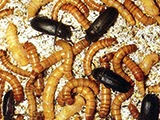Caroline Zanchi’s PhD thesis
 Evolutionary ecology of transgenerational immune priming in an insect
Evolutionary ecology of transgenerational immune priming in an insect
Defended on the 27th December 2012
Funding: ANR trans-immunity
Supervisors: Yannick Moret and Jérôme Moreau
Started in October 2009
The PDF file is downloadable [at this address].
Abstract
Trans-generational immune priming (TGIP) is defined as the plastic enhancement of offspring’s immunocompetence following an immune challenge of the females of the parental generation. In vertebrates, this phenomenon is well described, and is achieved by the maternal transfer of antibodies. In invertebrates however, it has only recently been described. Since invertebrates do not possess antibodies, the mechanism of this transmission remains unknown.
If the offspring is exposed to the maternal infection, an elevated immunocompetence can help it cope better with it. Nonetheless, apart from this benefit, several cues indicate that the TGIP bears some fitness costs for individuals. The evolution of TGIP will be favoured when its benefits outweigh its fitness costs. Thus, studying its costs and benefits can lead us to a better understanding of the selection pressures that lead to its evolution in invertebrates.
During my thesis, I associated the occurrence of TGIP in an insect, the mealworm beetle Tenebrio molitor, to several fitness costs for the females transmitting it as well as for the offspring receiving it.
Jury
Benjamin Gourbal, université de Perpignan – examinateur
Yanis Michalakis, CNRS, université de Montpellier II – rapporteur
Jérôme Moreau, université de Bourgogne – codirecteur
Yannick Moret, CNRS, université de Bourgogne – directeur
Thierry Rigaud, CNRS, université de Bourgogne – examinateur
Paul Schmid-Hempel, ETH Zürich – rapporteur
- extrait:
- lien_externe:
- kc_data:
- a:8:{i:0;s:0:"";s:4:"mode";s:0:"";s:3:"css";s:0:"";s:9:"max_width";s:0:"";s:7:"classes";s:0:"";s:9:"thumbnail";s:0:"";s:9:"collapsed";s:0:"";s:9:"optimized";s:0:"";}
- kc_raw_content:
 Evolutionary ecology of transgenerational immune priming in an insect
Evolutionary ecology of transgenerational immune priming in an insectDefended on the 27th December 2012
Funding: ANR trans-immunity
Supervisors: Yannick Moret and Jérôme Moreau
Started in October 2009
The PDF file is downloadable [at this address].
Abstract
Trans-generational immune priming (TGIP) is defined as the plastic enhancement of offspring's immunocompetence following an immune challenge of the females of the parental generation. In vertebrates, this phenomenon is well described, and is achieved by the maternal transfer of antibodies. In invertebrates however, it has only recently been described. Since invertebrates do not possess antibodies, the mechanism of this transmission remains unknown.
If the offspring is exposed to the maternal infection, an elevated immunocompetence can help it cope better with it. Nonetheless, apart from this benefit, several cues indicate that the TGIP bears some fitness costs for individuals. The evolution of TGIP will be favoured when its benefits outweigh its fitness costs. Thus, studying its costs and benefits can lead us to a better understanding of the selection pressures that lead to its evolution in invertebrates.
During my thesis, I associated the occurrence of TGIP in an insect, the mealworm beetle Tenebrio molitor, to several fitness costs for the females transmitting it as well as for the offspring receiving it.
Jury
Benjamin Gourbal, université de Perpignan – examinateur
Yanis Michalakis, CNRS, université de Montpellier II – rapporteur
Jérôme Moreau, université de Bourgogne – codirecteur
Yannick Moret, CNRS, université de Bourgogne – directeur
Thierry Rigaud, CNRS, université de Bourgogne – examinateur
Paul Schmid-Hempel, ETH Zürich – rapporteur
